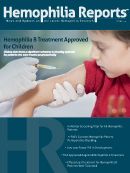Publication
Article
Hemophilia Reports
Long-Term Relief for Hemophilia B Patients
Author(s):
Long-term relief for hemophilia B patients was achieved via adeno-associated virus treatments, according to findings published in The New England Journal of Medicine.

Gene therapy provided safe and long-term relief for patients with severe hemophilia B, according to findings reported in The New England Journal of Medicine.
Researchers from St. Jude Children’s Research Hospital evaluated the stability of transgene expression and long-term safety in 10 male patients with severe hemophilia B. Six of those patients had been involved in a phase 1 dose-escalation trial using a modified adeno-associated virus (AAV) as the delivery mechanism for making Factor IX; 2 patients received a low, intermediate, or high dose, and 4 patients received a high dose.
In all 10 patients, FIX levels rose and remained stable for more than 4 years. Episodes of spontaneously bleeding decreased 90 percent. After the investigational therapy, FIX replacement therapy in the patients declined 92 percent in the first 12 months. No late toxic effects from the therapy were reported, the authors noted.
Blood clotting protein levels increased from >1 percent to more than 5 percent in the 6 patients that received the highest doses of therapy. The researchers reclassified those patients’ hemophilia from severe to mild. The patients were allowed to participate in sports such as soccer without the need for FIX replacement therapy or an increased risk of bleeding. For those patients, episodes of spontaneous bleeding and use of FIX replacement therapy decreased more than 94 percent over 12 months.
There were 4 patients for whom liver enzymes rose after treatment with the highest dose, though the researchers hypothesize that was due to an immune response against the vector. Otherwise, those participants remained healthy. After a brief treatment with steroids, their liver enzymes returned to normal ranges.
“This study provides the first clear demonstration of the long-term safety and efficacy of gene therapy,” senior author Andrew Davidoff, MD, chair of the St. Jude Department of Surgery, said in a press release. “The results so far have made a profound difference in the lives of study participants by dramatically reducing their risk of bleeding.”
Seven of the enrolled participants had been receiving at least once weekly FIX therapy treatment in order to prevent bleeding episodes. Since joining the studies, though, 4 of those 7 patients ceased their routine FIX treatment injections. Some of them have not required clotting factor treatment in nearly 4 years, which the researchers noted, has changed their lives. The others used as needed therapy to control bleeding prior to surgeries.
“The data we are reporting mark a paradigm shift in treatment of hemophilia B and lay the groundwork for curing this major bleeding disorder,” Amit Nathwani, MD, PhD, first and corresponding author of the paper, continued in the statement. “The results also provide a solid platform for developing this gene transfer approach for treatment of other disorders ranging from other congenital clotting deficiencies like hemophilia A to inborn errors of metabolism such as phenylketonuria.”
The ongoing study now includes 12 patients, and eventually, the researchers hope to include younger hemophilia B patients and expand into exploring the treatment of hemophilia A patients via the same methods.






